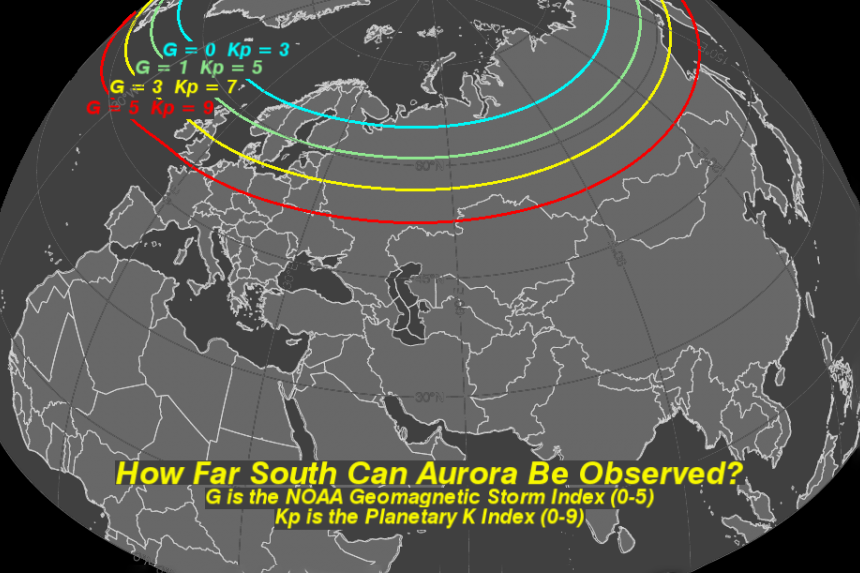What Kp Index You Need to See the Northern Lights
The level of geomagnetic activity (Kp) you need to see the northern or southern lights depends on your geomagnetic coordinates. Let's see how to find this level for your specific location.
Image from NOAA Space Weather Prediction Center
A bit of a theory
The main principle is that the higher the Kp, the further the aurora extends from the polar regions toward the equator. When the Kp = 0, the aurora reaches the 66° geomagnetic latitude and goes equatorward by 2° with each new Kp level. Thus at Kp = 4, it gets to 58°. The "reaches" means that you can expect aurora overhead. Two steps lower Kp is usually enough to see the aurora on the horizon. The problem is that the geomagnetic latitude is different from the geographic latitude.
Where to find the required Kp for your location
The best and easiest way is to use the app that shows you the minimum Kp indices required to see the aurora overhear and on the horizon for all the locations you add to the app. Just switch this feature on in the settings. Alternatively, you can use the geomagnetic coordinate calculator to determine your geomagnetic coordinate and calculate the Kp. How to calculate it is explained above. You can also find the location of your interest on the map where lines show what Kp you need to see the aurora overhead.
Kp for the aurora overhead / on the horizon for famous northern lights photography regions:
Canada, Churchill Kp0 / Kp0
Canada, Whitehorse Kp2 / Kp0
Canada, Yellowknife Kp0 / Kp0
Iceland, Reykjavik Kp2 / Kp0
Alaska, Fairbanks Kp1 / Kp0
Finland, Rovaniemi Kp2 / Kp0
Finland, Levi Kp1 / Kp0
Sweden, Kiruna Kp1 / Kp0
Norway, Tromso Kp0 / Kp0
As you can see, all the popular regions are so far in the north that you can see the northern lights with any level of geomagnetic activity. Remember that the Kp0-Kp2 level is considered low, meaning faint aurora even in a suitable location. So, in these regions, you want the Kp index to be higher and the aurora to be more active and colorful.
Kp for the aurora overhead / on the horizon for some photography regions that are not so close to the poles:
Canada, Peyto Lake Kp5 / Kp3
Canada, Jasper Kp4 / Kp2
Denmark, Faroe Islands Kp4 / Kp2
New Zealand, Nugget Point Kp7 / Kp5
Australia, Hobart Kp7 / Kp5
Scotland, Isle of Skye Kp6 / Kp4
There are a lot of places where you can capture the terrific northern or southern lights. Considering solar activity is heading towards its 11-year maximum, you have excellent opportunities for aurora photography in the coming years.
